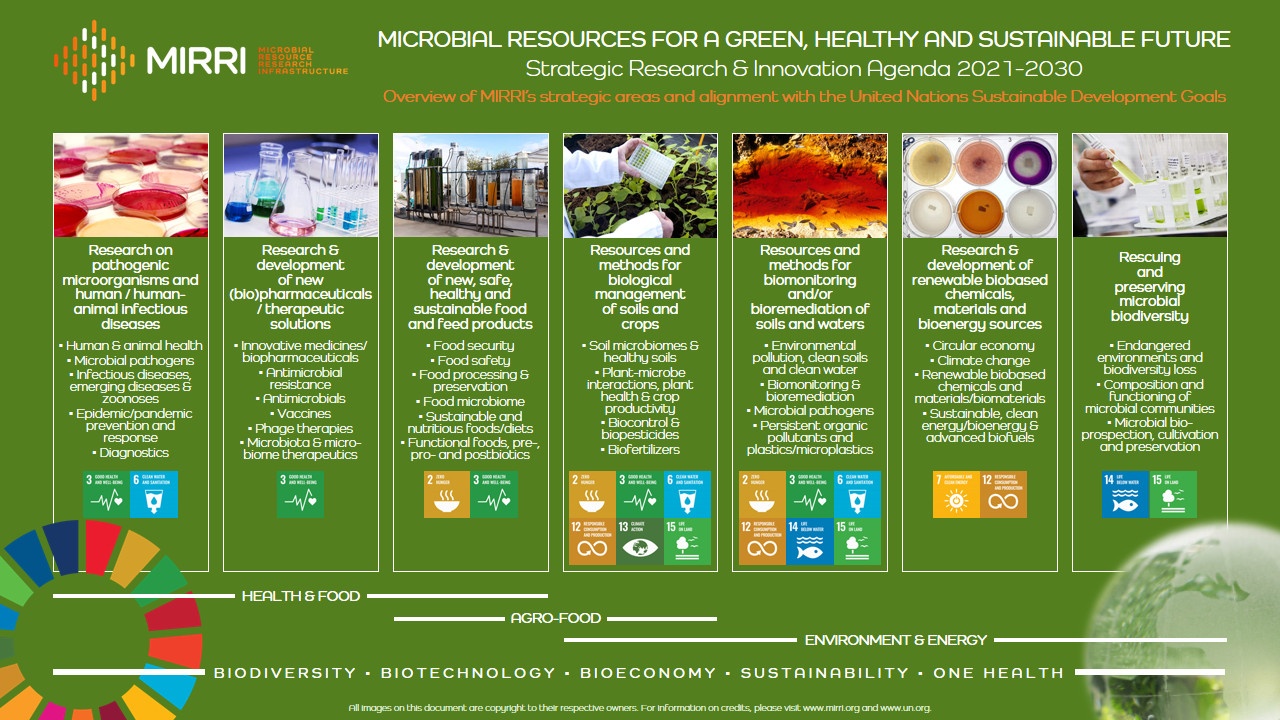Overview
The Microbial Resource Research Infrastructure – European Research Infrastructure Consortium (MIRRI-ERIC) is the pan-European distributed Research Infrastructure for the preservation, systematic investigation, provision and valorisation of microbial resources and biodiversity.
MIRRI brings together 50+ microbial domain Biological Resource Centres (mBRCs), culture collections and research institutes from ten European countries – Belgium, France, Latvia, Portugal and Spain are founding Members of MIRRI-ERIC, while Greece, Italy, Netherlands and Poland are prospective Members, and Romania a prospective Observer..
MIRRI integrates the European Strategy Forum on Research Infrastructures (ESFRI) Roadmap since 2010 and, in 2021, has become a ‘Landmark’ in its Health & Food domain.
MIRRI-ERIC has been set up by the Commission Implementing Decision (EU) 2022/1204 of 16 June 2022.
MIRRI envisions a greener, healthier and more sustainable world, based on the preservation, study and valorisation of microbial resources and biodiversity.
Mission
The mission of MIRRI is to serve Bioscience and Bioindustry users by facilitating access to a broad range of high-quality bioresources and data in a legal compliant way. By offering access to human expertise and providing a collaborative platform for long-term sustainability of microbial biodiversity, MIRRI will increase knowledge and promote professional development.

High-quality bioscience research and innovative bioindustries are key contributors to tackle global societal challenges, today and in the future, towards a green, healthy and sustainable world.
MIRRI strives to achieve these goals, and by matching the resources, capabilities and expertise of all its partner organisations with the global and European strategic agendas – such as the UN Sustainable Development Goals, the EU Horizon Europe, its Clusters, Missions and Partnerships, and the ESFRI Roadmap, Strategy Report and Landscape Analysis –, as well as with national/regional Research and Innovation Strategies for Smart Specialisation (RIS3) of its participating countries, MIRRI is placing its strategic focus, for the decade ahead, over a selected group of socioeconomically very relevant areas.

MIRRI continuously analyses the landscape and scans the horizon in these areas, in order to systematically anticipate gaps and opportunities, aiming at better addressing the effective needs of its user communities, and helping them deliver the maximum value and impacts from their projects, technologies and products.
These are the bases for MIRRI’s Strategic Research & Innovation Agenda 2021-2030, a “living document” to be revised and updated at the rhythm that the global challenges, the research and innovation landscape and the users’ needs will dynamically change and evolve.
MIRRI has entered the European Strategy Forum on Research Infrastructures (ESFRI) Roadmap in 2010.
The Preparatory Phase started with the EU-FP7-funded project “Microbial Resource Research Infrastructure” – MIRRI (grant agreement no. 312251), coordinated by the Leibniz-Institute DSMZ Culture Collection and with the consortium bringing together 16 partners and 20 collaborative parties.
The Preparatory Phase ended in April 2016, but the consortium has continued working on the preparation of the European Research Infrastructure Consortium (ERIC) submission, governed by an Assembly of prospective Members (ApM) and an Interim National Coordinators Forum (INCF).
In April 2018, the ApM accepted the Portuguese-Spanish proposal to host the Central Coordinating Unit (CCU), with the approval from the seven propective country members (Belgium, France, Greece, Latvia, Poland, Portugal and Spain), which have previously signed the MIRRI Memorandum of Understanding (MoU). The MIRRI CCU is shared by Portugal (statutory seat) and Spain (hosting the Collaborative Working Environment hub).
The first step submission for the MIRRI-ERIC application was completed at the end of 2018, and the second step in 2020.
The same year marked the launch of the EU H2020 project “IS_MIRRI21 – Implementation and Sustainability of Microbial Resource Research Infrastructure for 21st Century” (grant agreement no. 871129), coordinated by the University of Minho MUM Culture Collection, and comprising 14 partners, distributed by 10 countries that have signed the MIRRI MoU. This 36-month project started on 1 February 2020, giving a new boost towards the implementation and consolidation of MIRRI as a fully-functional Research Infrastructure.
In December 2021, MIRRI has been recognised as a “Landmark” on the ESFRI Roadmap 2021.
In June 2022, MIRRI has been granted the legal status of ERIC by the European Commission – Commisson Implementing Decision (EU) 2022/1204 of 16 June 2022.
The European Strategy Forum on Research Infrastructures (ESFRI) is a strategic instrument to develop the scientific integration of Europe and strengthen its international outreach. The competitive and open access to high-quality Research Infrastructures supports and benchmarks the quality of the activities of European scientists and attracts the best researchers from around the world.
Research Infrastructures are fundamental pillars for the European Research Area (ERA) and key contributors to the EU’s industrial competitiveness and strategic autonomy. They are decisive for the EU’s capacity to deliver scientific breakthroughs and to foster innovation. They play a critical role in addressing global (societal, environmental, economic) challenges and the Sustainable Development Goals. They are essential to deliver the goals and impacts of EU’s priorities, policies and programmes – including Horizon Europe, its Clusters, Missions and Partnerships –, as well as of the national/regional Research and Innovation Strategies for Smart Specialisation (RIS3). Research Infrastructures “make science and innovation happen”, towards a “green, digital and more resilient Europe”.
To learn more about ESFRI Research Infastructures, please visit https://roadmap2021.esfri.eu/.




